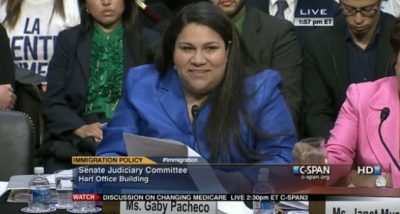Immigration Reform
The last time Congress updated our legal immigration system was November 1990, one month before the World Wide Web went online. We are long overdue for comprehensive immigration reform.
Through immigration reform, we can provide noncitizens with a system of justice that provides due process of law and a meaningful opportunity to be heard. Because it can be a contentious and wide-ranging issue, we aim to provide advocates with facts and work to move bipartisan solutions forward. Read more about topics like legalization for undocumented immigrants and border security below.
Senate Hearing Reinforces Why Congress Needs To Pass Comprehensive Immigration Reform
For more than seven hours on Monday, the Senate Judiciary Committee listened to testimony from almost two dozen people about the immigration reform bill a bipartisan group of senators introduced last week. From visas for farm workers and other foreign workers to the mandatory E-Verify system included in the bill, senators debated and questioned the witnesses about all aspects of immigration reform. Read More

Letting Tragedy Guide, Not Derail Policy-Making
Last week, the U.S. Senate introduced a long-awaited immigration reform bill, which many are predicting is our best chance in 20 years to fix the broken immigration system. While awaiting the Senate’s formal introduction however, devastating events unfolded in Boston. The nation stood transfixed on developments in Massachusetts, as did the Senators and those involved in immigration reform efforts. Read More

Former Bush Administration Official Explains Why Immigration Bill Is Good For The Economy
Following the introduction of the Senate immigration reform bill earlier this week, the Senate Judiciary Committee held its first hearing about the measure today. It gave the senators a chance to air their various complaints about the bill – that it does not protect LGBT couples or that the bill micro-manages the hiring process for foreign workers – but largely, committee members asked about the ways immigration reform will impact the U.S. economy, from the agriculture industry to high-skilled industries. Read More

Immigration Bill Praise Further Marginalizes Opponents
Now that the Senate’s “Gang of Eight” has officially introduced its immigration bill, the public, analysts, and newspaper editorial boards are all having a chance to weigh in about the sweeping overhaul of the nation’s broken immigration system. The reaction from many has been positive because, while it is not a perfect measure, the legislation makes huge strides toward creating a more workable immigration system, including a path to citizenship for the 11 million undocumented immigrants already in the U.S. The bill also allocates more funding to enhance border security and significantly rewrites the current visa system, carving out new opportunities, even as it may close some traditional immigration doors. Read More

Early Concerns With Senate Immigration Bill
The “Gang of Eight” officially introduced their comprehensive immigration reform bill—the Border Security, Economic Opportunity and Immigration Modernization Act—in the Senate today, capping off months of negotiations to craft a bipartisan solution. As many have said, it is not a perfect bill, but it is a good compromise that will go far in an attempt to fix our broken immigration system. Read More

Senate Immigration Bill Has Arrived!
The Senate’s “Gang of Eight” has introduced the “Border Security, Economic Opportunity and Immigration Modernization Act” in the 113th Congress. The bill is 844 pages long and will no doubt invite weeks of debate on many of its provisions. The bill is the culmination of months of work… Read More

Senate Immigration Bill Has Arrived!
The Senate’s “Gang of Eight” has introduced the “Border Security, Economic Opportunity and Immigration Modernization Act” in the 113th Congress. The bill is 844 pages long and will no doubt invite weeks of debate on many of its provisions. The bill is the culmination of months of work… Read More

Details Begin to Emerge on New Immigration Bill
Ahead of the expected release of a comprehensive immigration reform bill in the Senate this week, details were released outlining the broad strokes of the bill. The “Gang of Eight”—a bipartisan group of senators who have been working to develop the proposal—delayed a press conference that had been planned for today about the bill out of respect for the victims of the Boston Marathon bombing. The Senate group could announce the final measure tomorrow Read More

Senators Close To Introducing Immigration Reform Bill
After months of negotiations, the bipartisan “Gang of Eight” is ready to introduce the Senate immigration reform bill this week. Details about the measure—like the billions it would earmark for border security and the new visa program it would create based on work skills—have been leaking ahead of an expected announcement. And the proposal would create a path to citizenship for the 11 million undocumented immigrants who already are living in the United States. Read More
Make a contribution
Make a direct impact on the lives of immigrants.
